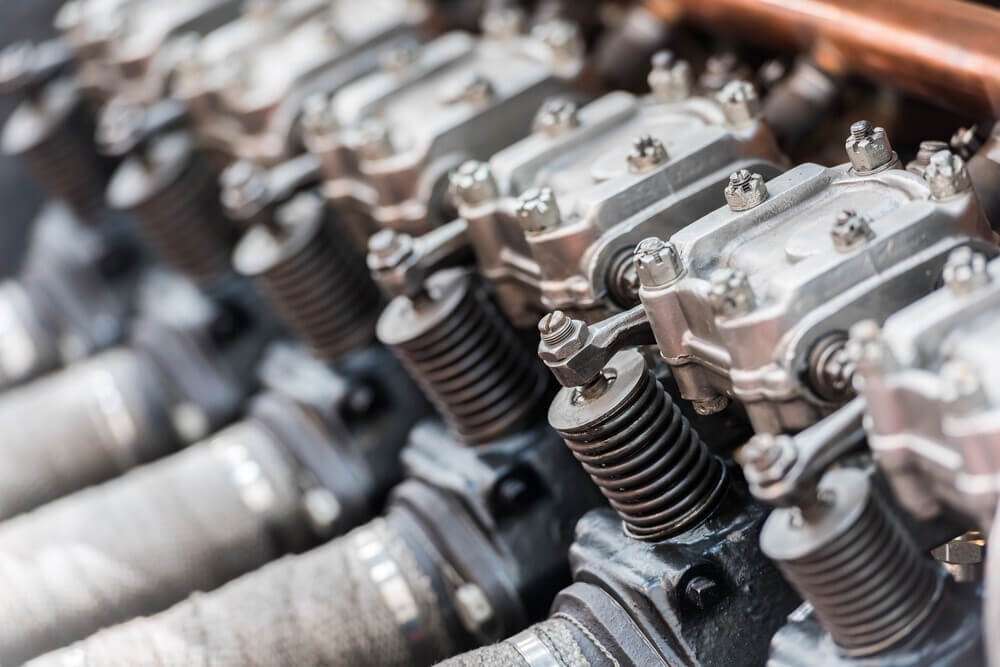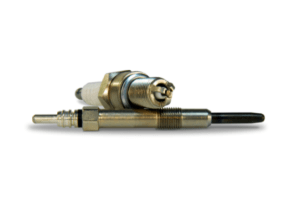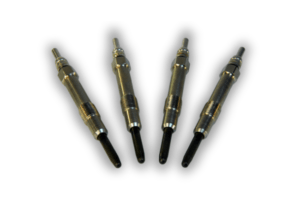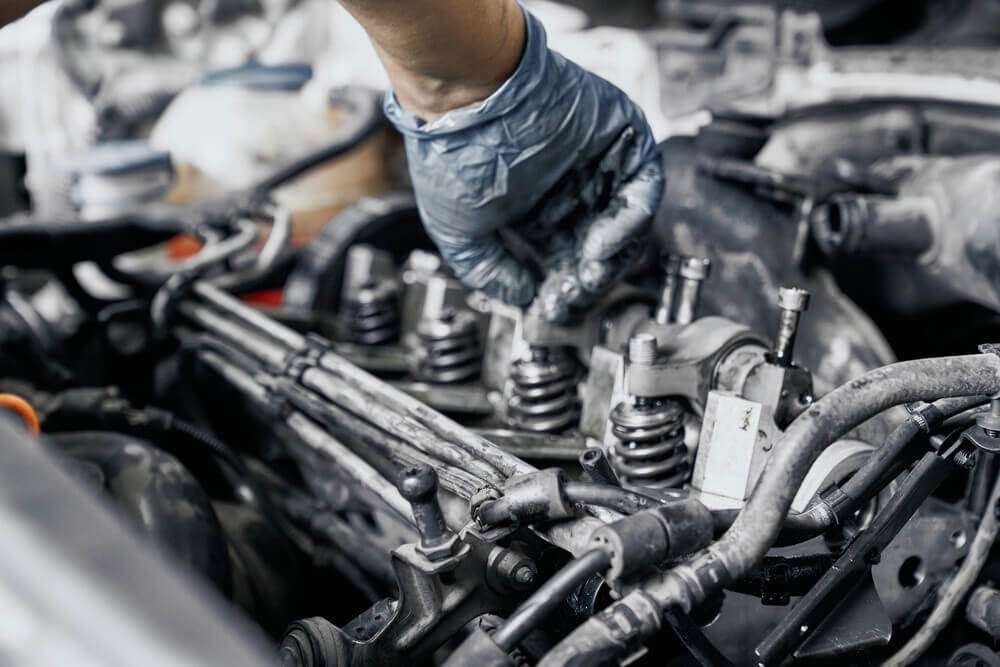When it comes to diesel engines, a common question arises: how many spark plugs does a diesel have? The answer might surprise you, as diesel engines work differently from their gasoline counterparts.
In this comprehensive guide, we will journey through the world of diesel engines, uncovering their unique properties and the role of glow plugs, the diesel engine alternative to spark plugs.
From understanding the basics of diesel engines to exploring the different types of glow plugs and their maintenance, we will provide you with a solid foundation on the subject. By the end, you will have a newfound appreciation for the intricacies of diesel engines and their place in the future of transportation.
Jump to
Short Summary
-
Diesel engines rely on compression ignition and distinct fuel compositions for efficient operation.
-
Glow plugs are used in diesel engines to heat the air in the combustion chamber, while spark plugs ignite gasoline engine fuel-air mixtures in the engine combustion chamber.
-
Diesel engines offer enhanced fuel economy, increased torque & better durability compared to gasoline. They face challenges from emissions regulations & competition from other engine types.
Understanding Diesel Engines

Diesel engines rely on a process called compression ignition, which sets them apart from gasoline engines that utilize spark plugs to ignite the fuel-air mixture. Instead of creating a spark for combustion, diesel engines compress air in the cylinder, generating high temperatures and pressure that ignite the fuel. This fundamental difference in their operation allows diesel engines to be more fuel efficient than their gasoline counterparts.
Moreover, diesel fuel has a distinct composition compared to gasoline, which further differentiates diesel engines from gas engines. The properties of diesel fuel, such as its density and viscosity, play a crucial role in how diesel engines operate and perform.
With this understanding of the key differences between gasoline and diesel engines, let’s delve deeper into the role of glow plugs in diesel engines.
Compression-Ignition
In diesel engines, the process of compression ignition occurs when the air in the cylinder is compressed to high pressure and temperature, causing the fuel-air mixture to ignite. This is a drastic difference compared to gas engines. In gas engines, the spark plug will provide an electric spark that will ignite the mixture of fuel and air. To facilitate the compression ignition process, diesel engines employ glow plugs, which assist in starting the engine in cold weather conditions.
Glow plugs heat up the air in the combustion chamber, allowing for easier ignition and optimal engine operation from the start. They play a crucial role in ensuring the smooth and efficient functioning of diesel engines, especially in cold weather.
Now that we understand the significance of compression ignition in diesel engines, let’s explore the properties of diesel fuel.
Diesel Fuel Properties
Diesel fuel is composed of hydrocarbons that have been distilled from crude oil, with properties such as density, viscosity, low-temperature operation ability, and sulfur content setting it apart from gasoline. Another important property of diesel fuel is its cetane number (or cetane index), which measures the combustion quality and influences the engine’s performance.
Fuel volatility, a measure of how readily a fuel vaporizes, also plays a role in determining the overall fuel quality and performance of diesel engines. Understanding the properties of diesel fuel is essential for comprehending the unique nature of diesel engines and their operation.
Glow Plugs: The Diesel Engine Alternative to Spark Plugs

Glow plugs serve a critical function in diesel engines, acting as a heating device to preheat the air in the combustion chamber and facilitating ignition in cold weather conditions. Unlike spark plugs, which generate a spark to ignite the fuel-air mixture, glow plugs focus on heating the air in the combustion chamber to ensure the smooth operation of the engine. This distinction between glow plugs and spark plugs highlights the unique nature of diesel engines and their reliance on compression ignition.
With their importance in cold weather engine start-ups, glow plugs significantly contribute to the overall performance and efficiency of diesel engines. To further understand the role of glow plugs, let’s examine their functionality and how they compare to spark plugs.
Glow Plug Functionality
Glow plugs play a vital role in diesel engines by preheating the air in the combustion chamber, allowing for easier ignition and smoother running, especially in cold weather. They come in two varieties: hot and cold glow plugs, each with its own strengths and applications. Hot glow plugs have a lower nitrogen content and are better suited for colder climates, while cold glow plugs have a higher nitrogen content, offering advantages in power and torque.
The operation of a glow plug consists of three phases: engine start, continuous heat, and after start. During the engine start phase, glow plugs rapidly heat up to assist in starting the engine. In the continuous heat phase, they maintain a steady temperature to ensure precise ignition of diesel fuel in the combustion chamber. Finally, in the after-start phase, glow plugs remain active for a few more minutes to sustain the combustion process, providing a reliable and efficient engine start-up.
Glow Plug vs. Spark Plug
While glow plugs and spark plugs share a similar design, their functions are notably different. Glow plugs are used in diesel engines to heat the air in the combustion chamber, making it easier to start the engine and maintain smooth operation, especially in colder conditions.
On the other hand, spark plugs are employed in a gas engine to ignite the fuel-air mixture, providing the combustion needed to power the engine. In essence, glow plugs are the diesel engine’s alternative to spark plugs, highlighting the unique operating principles of diesel engines and their reliance on compression ignition.
Diesel Engine Glow Plug Count
So, how many glow plugs does a diesel engine have? Diesel engines typically feature one glow plug per cylinder. This design helps to provide efficient and effective combustion in the engine. This means that for a six-cylinder diesel engine, there would typically be six glow plugs, while an eight-cylinder engine would have eight glow plugs. The number of glow plugs in a diesel engine plays a crucial role in ensuring efficient combustion and smooth engine operation, particularly in cold weather conditions.
It is important to note, however, that there are exceptions and variations to this standard. Some diesel engines might not require glow plugs at all, or they may have a different number of glow plugs per cylinder. Understanding the typical glow plug count in diesel engines helps in diagnosing potential issues and maintaining engine performance.
One Glow Plug per Cylinder
The concept of one glow plug per cylinder means that each cylinder in a diesel engine has its own glow plug, ensuring efficient combustion and smooth engine operation. This configuration offers benefits such as enhanced combustion efficiency, improved fuel economy, and reduced emissions.
However, the primary downside of having one glow plug per cylinder is that it necessitates more maintenance and can be more costly than other arrangements.
There are exceptions and variations to the one glow plug per cylinder standard. In some cases, diesel engines may be equipped with two glow plugs per cylinder, or a single glow plug for multiple cylinders. These variations highlight the diversity in diesel engine design and the importance of understanding the specific requirements of your vehicle.
Exceptions and Variations
Although most diesel engines feature one glow plug per cylinder, it is crucial to be aware of the exceptions and variations that exist. Some diesel engines may not require glow plugs at all, while others may have a different number of glow plugs per cylinder.
These variations serve as a reminder that diesel engine designs can differ significantly, and understanding the specific requirements of your vehicle is essential for maintaining optimal engine performance and efficiency.
Types of Glow Plugs for Diesel Engines

There are three primary types of glow plugs available for diesel engines: steel glow plugs, ceramic glow plugs, and pressure sensor glow plugs. Each type of glow plug offers its own advantages and drawbacks, depending on the specific requirements of the diesel engine and the operating conditions. Selecting the right type of glow plug for your vehicle is essential for maintaining optimal engine performance and efficiency.
In the following sections, we will delve into the characteristics and benefits of each type of glow plug, providing you with the knowledge needed to make an informed decision when it comes to choosing the right glow plug for your diesel engine.
Steel Glow Plugs
Steel glow plugs are known for their dependability and efficiency in initiating the engine in very low temperatures. Although they may have a longer starting time compared to other types of glow plugs, a steel glow plug can still reliably start a diesel engine in cold weather. They are the most cost-effective option and are suitable for individuals who do not drive frequently or inhabit areas with moderate climates.
Steel glow plugs are available for both two- and three-stage glow systems, providing versatility and adaptability for various diesel engine designs. If you’re looking for a dependable and budget-friendly option, steel glow plugs may be the right choice for your diesel engine.
Ceramic Glow Plugs
Ceramic glow plugs are composed of ceramic material and are known for their ability to heat up quickly and reach higher temperatures than other types of glow plugs. This rapid heating capability makes ceramic glow plugs highly efficient and reliable for starting diesel engines in cold climates. Their quick start times and ability to retain heat for longer periods also contribute to their improved performance in cold temperatures.
In terms of fuel efficiency, ceramic glow plugs offer advantages as well. Their efficient heating of the combustion chamber results in more efficient burning of diesel fuel, contributing to better overall engine performance.
If you live in an area with colder temperatures or frequently drive in cold weather, ceramic glow plugs might be the ideal choice for your diesel engine.
Pressure Sensor Glow Plugs
Pressure sensor glow plugs stand out due to their built-in pressure sensor, which provides valuable information about the pressure in the combustion chamber. This information can help optimize engine performance and fuel efficiency by monitoring and adjusting the combustion process. Pressure sensor glow plugs are particularly useful for drivers who want to keep a close eye on their vehicle’s fuel efficiency and performance.
While pressure sensor glow plugs offer several benefits, they may not perform as effectively in colder temperatures as ceramic glow plugs. However, they still provide reliable engine start-ups and contribute to overall engine efficiency.
If fuel efficiency monitoring is important to you, pressure sensor glow plugs may be a suitable choice for your diesel engine.
Maintaining Your Diesel Engine’s Glow Plugs
Regular inspection and replacement of glow plugs are essential for maintaining optimal engine performance and efficiency in diesel engines. Failing glow plugs can lead to slow starts, rough idle, and decreased performance, making it crucial to address any potential issues as soon as possible.
In the following sections, we will discuss the signs of bad glow plugs and provide recommendations for replacement frequency. By staying proactive and keeping an eye on the condition of your glow plugs, you can ensure that your diesel engine continues to operate efficiently and reliably, minimizing the risk of engine damage and future diesel engine work while still maintaining optimal fuel economy.
Signs of Bad Glow Plugs
Bad or failing glow plugs can manifest in various ways, affecting the performance and efficiency of your diesel engine. Some common symptoms of faulty glow plugs include engine misfires, difficulty starting the vehicle, poor acceleration, and decreased engine performance. Other indications of bad glow plugs can include slow starts, rough idle, and poor overall performance.
If you notice any of these symptoms, it is crucial to inspect and potentially replace your glow plugs as soon as possible. This will help prevent further engine damage and maintain your diesel engine’s performance and fuel efficiency.
Replacement Frequency
Glow plugs typically have a lifespan of around 100,000 miles, although this may vary depending on the make and model of your vehicle. It is recommended to inspect glow plugs every 12,000 miles and replace them as needed.
The cost of replacing glow plugs usually falls between $200 and $300. To ensure the best performance and longevity of your diesel engine, always consult your owner’s manual or a professional mechanic for specific instructions on glow plug maintenance and replacement.
Diesel Engines in the Future of Transportation
As the transportation landscape evolves, diesel engines continue to play a significant role, particularly in the heavy-duty transport sector. Currently, diesel engines power 76% of all commercial trucks and are expected to maintain an 80% engine share for heavy goods vehicles up to 2030.
Despite their dominance in the heavy-duty sector, diesel engines account for less than one-third of vehicles on Europe’s roads. With increasing competition from electric vehicles and hybrids, the future of diesel engines will depend on their ability to adapt and overcome challenges.
Advantages of Diesel Engines
Diesel engines offer several advantages over other engine types. Their higher compression ratio allows them to extract more energy from the fuel, resulting in improved fuel economy and increased torque compared to gasoline engines. In addition, diesel engines are known for their durability and require less maintenance than gasoline engines, further contributing to their longevity and cost-effectiveness.
These benefits make diesel engines an attractive option for many drivers, particularly those in the commercial and heavy-duty sectors. However, diesel engines also face challenges and competition that may impact their future role in transportation.
Challenges and Competition
One of the main challenges facing the diesel engine industry is the stringent emissions regulations being implemented worldwide, pushing manufacturers to develop cleaner and more efficient engines. Additionally, diesel engines face competition from alternative engine types, such as gasoline, electric, and hybrid.
To remain competitive and relevant in the evolving transportation landscape, diesel engines will need to address these challenges and continue to offer the advantages that have made them popular in the first place. By focusing on their strengths, such as fuel economy, torque, and durability, diesel engines can maintain their position in the transportation sector and continue to be a viable option for many drivers.
Summary
Throughout this comprehensive guide, we have explored the unique aspects of diesel engines, delving into their operation principles, the role of glow plugs, and the importance of regular maintenance. We have also discussed the various types of glow plugs available and their suitability for different driving conditions and requirements.
As we look towards the future of transportation, diesel engines will continue to face challenges and competition from alternative engine types. However, by capitalizing on their inherent advantages, such as fuel economy, torque, and durability, diesel engines can continue to play a significant role in the transportation sector, offering drivers a reliable and efficient option for years to come.
Frequently Asked Questions
Do any diesels have spark plugs?
Yes, some diesel engines do come equipped with glow plugs in place of spark plugs. Glow plugs help the engine to start up more quickly when it is cold, allowing them to replace spark plugs in colder climates and conditions.
In these cases, the glow plugs are heated up by the engine’s electrical system before the engine is started. This helps reduce the amount of time it takes for the process.
How many spark plugs are in an 8-cylinder diesel engine?
An 8-cylinder diesel engine requires eight spark plugs in order to operate. This is due to the fact that most diesel engines run on one glow plug per engine cylinder, so an 8-cylinder engine needs eight glow plugs for complete functionality.
How many spark plugs does a V8 have?
A typical V8 engine has 8 spark plugs, one for each cylinder. However, engines like the 6.4 Hemi have two spark plugs per cylinder, making a total of 16 spark plugs.
To maximize performance, V8s may require more or fewer spark plugs depending on their design and technological advancement.
How many spark plugs does a Ford diesel have?
Unlike gas-fueled engines, diesel engines don’t rely on spark plugs; therefore they don’t have any. Instead, they use a combination of air and heat to combust the fuel, which is ignited by compression ignition or glow plugs.
Therefore, the answer is that a Ford diesel engine has zero spark plugs.
Do diesel engines have spark plugs?
No, diesel engines do not have spark plugs; they use a form of compression ignition instead. In order to ignite the fuel in a diesel engine, it is necessary to generate high temperatures within the combustion chamber by compressing air which heats the fuel until it combusts.
Spark plugs are not used as part of this process.

My name is Tom Harris, founder of this blog. I’m a mechanical engineer with 20 years of experience in the automotive industry. I’m here to help you with your vehicle’s problems, easy fixes and share my insights and experience so that you can enjoy your rides more.

